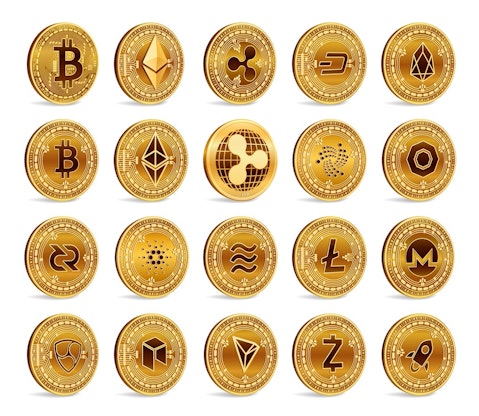Governments and exchanges in Asia to Europe are heading a rat race to digitalize everything, including bonds and real estate. Dubai is welcoming electronic currency funds, Singapore is re-inventing its financial system for Project Guardian and Malta, or the so-called Blockchain Island, is converting its policies into projects. The worldwide competitive rivalry to own the tokenized markets is accelerating and altering the manner in which we possess, buy and handle properties.

Cryptocurrency physical coins set. 3D Golden Crypto currency coins isolated on white background. Bitcoin, Ripple, Ethereum, Litecoin, Monero and other. Vector illustration
The Tokenization Boom
The global financial infrastructure is shifting to a new era of tokenization, where real-life assets are converted into digital tokens on blockchain networks. Crypto startups previously used tokenization as a tool, but it has now become a priority for major economies in the United States, Europe, and the Middle East. It is attractive, as it is rapid, allows people to purchase slices of assets, and is now more affordable: assets are capable of making payments immediately, buying in the global market, and may be sold at a later time.
In other areas outside of finance, tokenization is expanding in real estate, logistics, healthcare, art, and entertainment. In London, developers are tokenizing property portfolios; in Norway, companies involved in energy are also tokenizing carbon credits, and auction houses in Paris are issuing blockchain certificates of authenticity.
The transformations are enormous in the video sphere and the entertainment industry. In Malta, Cyprus, and some Eastern European areas, casinos and online gaming corporations have started employing tokenized loyalty systems and allowing crypto payments with the help of e-wallets and prepaid cards.
Another example is particularly intriguing due to the thriving local technological gaming industry. The Israeli casinos market has been the first to introduce crypto and tokenized account values. These friendlier Hebrew sites allow visitors to invest using Bitcoin, Ethereum, or stablecoins. The money would be immediately converted into gaming credits and withdrawn through e-wallets and prepaid cards.
Dubai
Dubai is at the forefront of controlled tokenized finance. Everything, including tokenized commodities and digital asset exchanges, is regulated by the Virtual Assets Regulatory Authority (established in 2022). The Dubai International Financial Centre (DIFC) provides banks and investors with a sandbox to experiment with new projects. Dubai has authorized tokenized gold and funds platforms, which collaborate with Ripple and Laser Digital of Nomura, reinforcing its status as a fintech hub.
The positive aspect of Dubai is its clear regulations, minimal taxes, and unrestricted access to capital. Exchange SEC vehicles. The city hosts hedge fund and asset manager establishments where they can access Asian and European investors, incurring a tokenized cross-border transaction.
Singapore
Singapore has an institutional approach that is disciplined. In Singapore, the Multi-bank project, called Project Guardian, initiated by the Monetary Authority of Singapore (MAS), aims to explore tokenized trades with standard banks, including JPMorgan, DBS, and Standard Chartered, in foreign exchange, credit, or repo. Singapore also operates a Digital Asset Sandbox and cooperates with the Bank for International Settlements in establishing global standards for permissioned blockchain networks.
Compared to the Dubai open model, Singapore emphasizes compliance and interoperability. The security of tokenized funds and bonds is very high, and issues under that oversight have captured the interests of sovereign wealth funds and international asset managers interested in scale, but not willing to face problems with regulatory authorities.
Malta
In 2018, the first European policy to establish laws regarding digital assets was the Virtual Financial Assets Act (VFA) of Malta. Following an initial boom, the regulations became more restrictive, and at present, Malta has the Digital Innovation Authority (DIA) and the MFSA, which are administering an expanding ecosystem. By virtue of a sandbox supported by the Malta Stock Exchange, the country now holds licenses for tokenized securities and funds, as well as gaming platforms.
This new interest can transform Malta into a niche yet consistent entry point to blockchain companies in the EU. An island-wide small regulatory environment has enabled start-ups on the island to become considerably more innovative, with a lack of regulation programs such as tokenized real-estate projects, casino reward programs, and even fractional art funds. The balance between these is one that larger markets are still struggling to replicate.
The Institutional Race Ahead
Analysts believe that by 2030, all securities, credit, real estate, and commodities will be covered by tokenized assets, which may surpass $ 16 trillion. Share classes that have been tokenized are being tested by hedge funds and private-market managers.
The leaders include KyBridge Capital, KKR, and Hamilton Lane. The proposal by Nasdaq 2025 has the potential to introduce tokenized equities in the United States soon, thereby connecting the traditional finance world and on-chain markets.
This change in institutions will push against boundaries: the trading of private funds will be as liquid as the trading of public stock, and will be delivered 24/7; it will be traded on smart contracts to enforce compliance. It is not just a matter of tech in the race, but rather a matter of geopolitics. The nations that establish the current rules of tokenization will govern global capital flows tomorrow.





